

Stone-age massacre offers earliest evidence of human warfare. Some 10,000 years ago a woman in the last stages of pregnancy met a terrible death, trussed like a captive animal and dumped into shallow water at the edge of a Kenyan lagoon.
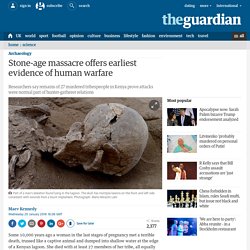
She died with at least 27 members of her tribe, all equally brutally murdered, in the earliest evidence of warfare between stone age hunter-gatherers. 'Hello mum, this is going to be hard for you to read ...' - Home News. In the spring of 2009, the 2nd Battalion, The Rifles deployed to Afghanistan.
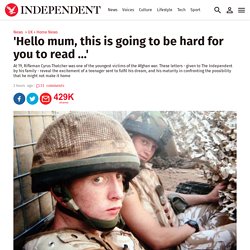
Halfway through the battalion's tour, it has lost nine soldiers, with dozens injured. Of those to have given their lives, four were teenagers. Here Rifleman Cyrus Thatcher, who was 19 when he was killed by an explosion near Gereshk seven weeks ago, tells his own story, through letters home and the last letter he left behind to bid farewell to his family – his mother Helena, father Robin and brothers Zac, 21, and Steely, 17. Following are the words of a proud soldier described by his officers as possessing "a rucksack full of potential", and by his friends as a rascal always cracking jokes and helping to keep morale high. Most of all, they are the words of a young son to his mum, dad and brothers.Terri Judd 27 April 2009 Hello Mum. Why Fight? Some Analytic Philosophy & A Politically Incorrect Answer. Editor’s Note: This article originally appeared, slightly altered, in a 2 Part series in Havok Journal under the title “Warfighter Intentions, the Munchhausen Trilemma & More”.
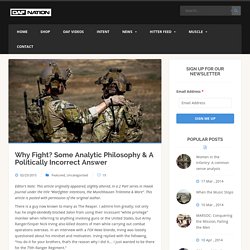
This article is posted with permission of the original author. There is a guy now known to many as The Reaper. I admire him greatly; not only has he single-skindedly blocked Salon from using their incessant “white privilege” moniker when referring to anything involving guns or the United States, but Army Ranger/Sniper Nick Irving also killed dozens of men while carrying out combat operations overseas. Why it’s so hard to come home from war. America’s war in Afghanistan has been its longest, and arguably its most grueling — and yet for 13 years it’s also been strangely invisible.

For those of us far removed from the front lines, it can be almost perplexing to remember the battles being fought in our name. Sebastian Junger’s work helps bring them back into focus. What ISIS Really Wants. What is the Islamic State?

Where did it come from, and what are its intentions? The simplicity of these questions can be deceiving, and few Western leaders seem to know the answers. In December, The New York Times published confidential comments by Major General Michael K. Nagata, the Special Operations commander for the United States in the Middle East, admitting that he had hardly begun figuring out the Islamic State’s appeal. 'I couldn't sit and do nothing': the women saving lives in Syria. As barrel bombs rain down on the Syrian city of Idlib, Hasnaa Shawaf and her team spring into action.
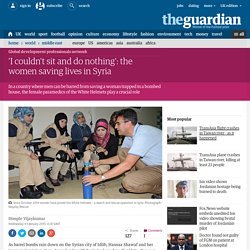
Armed only with basic tools and medical kits, they are first responders for the Syria Civil Defence, a volunteer organisation training the country’s newest generation of search and rescue workers. “I desperately wanted to help,” says Shawaf. “I couldn’t just sit and do nothing.” Shawaf was working as a maths teacher in her hometown of Maaret al-Numan when she heard about the Syria Civil Defence. When the war showed no signs of stopping soon, she began volunteering. The volunteers serve communities in rebel-held areas facing sustained onslaughts from the regime. Since last October, more and more women have joined the White Helmets, as they’re known.
Ebaa Tome was studying law in Idlib when the conflict turned her life upside down. The women trained together in light urban search and rescue before travelling to Turkey to specialise in pre-hospital trauma life support. Chance reunion in Calais brings home scale of migration from Eritrea. On a cold January day, Feruz Werede travelled from her home in London to Calais to learn more about the thousands of young people who are risking their lives to flee the country of her birth, Eritrea.

Feruz, an activist who campaigns to end rights abuses in Eritrea, wanted to interview migrants for a radio station that broadcasts by satellite to the Horn of Africa country. She expected to hear about the “never-ending national service” and to collect material for a Stop Slavery in Eritrea campaign against conscription. What next for South Sudan's 3,000 freed child soldiers? At a ceremony on Tuesday, 280 child soldiers were released in Gumuruk, South Sudan, following a peace agreement between President Salva Kiir’s government and the South Sudan Democratic Army (SSDA) Cobra Faction militant group in Jonglei State.

The boys, aged between 11 and 17, sat huddled in rows, some wearing premier league football shirts, others still in their flag-emblazoned khakis. There to lay down their weapons and enter reintegration programmes run by Unicef and various local partner organisations, the ceremony was emotional. ‘We are so proud' – the women who died defending Kobani against Isis. Shireen Taher Mustafa Taher, 30, a lawyer and Kurdish language teacher, on his sister.
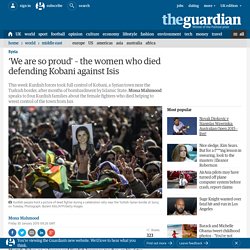
Security: Return of the hired gun.